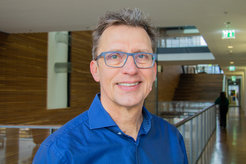Salk Institute names plant geneticist Detlef Weigel as Nonresident Fellow
Max Planck Institute for Biology Tübingen Director joins Salk’s Scientific Advisory Group

The Salk Institute has named plant geneticist Detlef Weigel a Nonresident Fellow, making him a member of the group of eminent scientific advisors who guide the Institute’s leadership. Weigel is a director and scientific member at the Max Planck Institute for Biology Tübingen in Germany, as well as an adjunct professor at the Salk Institute and University of Tübingen.
“We look forward to welcoming Detlef Weigel back to Salk as a Nonresident Fellow,” says Salk Institute President Gerald Joyce. “His expertise in plant biology, particularly in understanding genetic variation and climate adaptation, will provide valuable support to our Harnessing Plants Initiative, in which we are optimizing plants to sequester carbon dioxide to mitigate climate change.”
Salk Nonresident Fellows serve as members of the faculty for renewable six-year terms. These individuals come from world-renowned academic organizations where they have achieved high levels of success in research areas that are represented at the Salk Institute. They visit Salk each year to help benchmark the Institute by advising on the scientific progress of its faculty and on the effectiveness of its existing and proposed scientific programs. The Nonresident Fellows also play a key decision-making role in the appointment and promotion of Salk faculty members.
“I am delighted to return to the Salk Institute as a Nonresident Fellow,” says Detlef Weigel. “The opportunity to broaden my collaboration with such exceptional scientists and help to ensure the legacy of my long-term collaborator and close personal friend, Joanne Chory, is both exciting and deeply meaningful to me.”
Detlef Weigel Curriculum
Weigel uses genomic techniques to study developmental and evolutionary plant biology, often using the common mustard weed Arabidopsis thaliana as a model. His lab discovered that an Arabidopsis gene could dramatically accelerate the flowering of trees, establishing this plant’s genetics as a platform for biotechnological discoveries. The team later discovered the first plant microRNA mutant and identified a mobile flower-inducing signal. Together with late Salk Professor Joanne Chory, Weigel was one of the first to exploit natural genetic variation to understand how the environment affects plant development. Today, Weigel is most interested in how wild plants can adapt to climate change and defend themselves against pathogens.
Weigel has received numerous honors, including the Leibniz Award of the DFG (2007), the Otto Bayer Award (2010), the GSA Medal of the Genetics Society of America (2016), and the Novozymes Prize (2020). He is an elected member of the European Molecular Biology Organisation (EMBO), the German National Academy of Sciences Leopoldina, the US National Academy of Sciences, the Royal Society of London, and the American Academy of Arts and Sciences. He serves on many advisory and editorial boards and has cofounded three biotech start-up companies.
He earned his undergraduate degree at the Universities of Bielefeld and Cologne and his PhD in biology from the University of Tübingen. He received his postdoctoral training at the California Institute of Technology and was a faculty member at the Salk Institute for almost 10 years before moving to the Max Planck Institute, where he founded the Department for Molecular Biology.
About the Salk Institute for Biological Studies
Unlocking the secrets of life itself is the driving force behind the Salk Institute. Our team of world-class, award-winning scientists pushes the boundaries of knowledge in areas such as neuroscience, cancer research, aging, immunobiology, plant biology, computational biology, and more. Founded by Jonas Salk, developer of the first safe and effective polio vaccine, the Institute is an independent, nonprofit research organization and architectural landmark: small by choice, intimate by nature, and fearless in the face of any challenge. Learn more at www.salk.edu.
